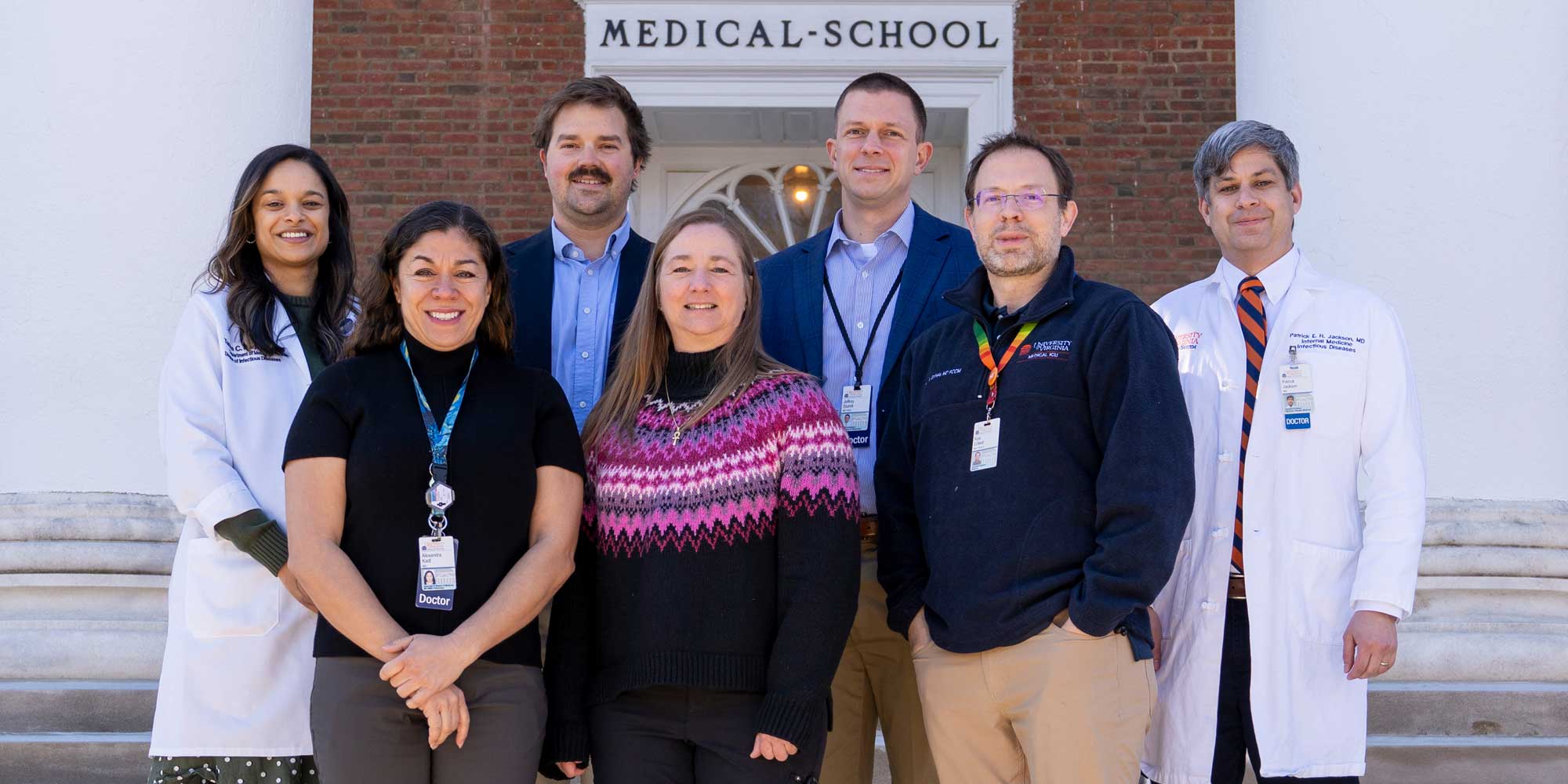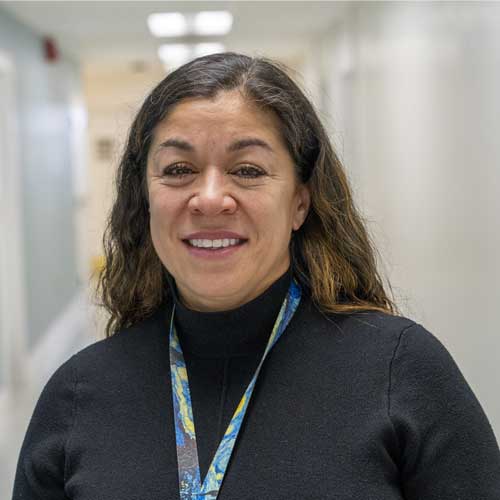
(From left) Front row: Alexandra Kadl, MD; Heather M. Haughey; and Kyle Enfield, MD. Back row: Tarina Parpia, MD; James Ingersoll, Jeff Sturek, MD, PhD, and Patrick Jackson, MD. (photo credit Harry Moxley)
Five years post pandemic, clinical investigators like Alexandra Kadl, MD, associate professor of medicine and pharmacology and Kyle Enfield, MD, professor of medicine, co-directors of UVA Health’s long COVID clinic, continue to treat patients with long COVID, a chronic disease that persists at least 3 months after the acute COVID infection ends. Long COVID is often associated with respiratory complaints, chronic cough, chronic shortness of breath, fatigue and sleep disturbances, but can present with more than 200 different symptoms. An estimated 5-30% of patients who have ever had a COVID-19 infection may have symptoms of long COVID.
Drs. Kadl and Enfield oversee UVA Health’s long COVID Clinic, one of the first sites across Virginia to care for patients with ongoing symptoms after acute COVID-19 infections. They began seeing patients in June 2020. “We have seen hundreds of patients with lingering symptoms, most commonly fatigue, an unexplained fast heart rate, sleep disturbances and brain fog,” said Dr. Kadl.
In February 2021, the Joint Emerging Disease Initiative (JEDI) to perform trials in acute COVID was established by Drs. Patrick Jackson, Jeff Sturek, and Kyle Enfield. Since then, their focus has shifted to also include long COVID trials, together with clinical researchers Dr. Kadl, Dr. Tarina Parpia, and clinical research core members Heathery Haughey, James Ingersoll, Valin Grebe, and Amy Kim.
Dr. Kadl and the team of clinical investigators recently joined several national clinical trials examining potential treatments for long COVID. The trials are part of the National Institutes of Health’s Researching COVID to Enhance Recovery (RECOVER) Initiative, a national research program to understand, diagnose and treat long COVID. “Our team is excited to participate in these clinical trials as we continue to seek better ways to care for patients with long COVID,” stated Dr. Kadl.
In this latest installment of our series “A Healthier Future—One Clinical Trial at a Time,” we spoke with Dr. Kadl to learn more about UVA’s long COVID clinic and its participation in the RECOVER clinical trials.

Alexandra Kadl, MD
Q. What have we learned about long COVID and what treatments do we have for patients at the UVA Health post-COVID clinic?
Kadl: There has been no exact cause identified for long COVID. Most research suggests it is caused by things like persistent presence of viral particles, immune dysregulation, or changes in the gut microbiome, just to name a few. There are currently no proven effective treatments to cure long COVID. We first rule out a patient’s underlying, treatable diseases, such as pulmonary fibrosis or obstructive lung diseases, arrhythmias, and heart failure, as well as endocrinopathies. We also have to eliminate unproven, costly therapies that promise a cure. Addressing mental health concerns and lifestyle adjustments may also benefit patients. But it’s important to understand that even after underlying diseases are eliminated and other symptoms are managed, there is no specific treatment for long COVID.
Q. Tell us about the two long COVID trials now enrolling participants at UVA.
Kadl: The first trial, RECOVER AUTONOMIC, is enrolling adults who developed symptoms of Postural Orthostatic Tachycardia Syndrome (POTS) after having COVID-19. POTS is characterized by an unexpectedly fast heart rate, dizziness, fatigue or a combination of these symptoms when a person stands from sitting or lying down. Initially, we’ll examine three potential treatments: (1) Gamunex-C, a form of intravenous immunoglobulin (IVIG) which contains antibodies to help the body protect itself against infections and is given by intravenous infusion; (2) Ivabradine, an oral medication that reduces heart rate; and (3) Coordinator-guided, non-drug care.
The second trial, RECOVER SLEEP, is a trial that is enrolling adults who had COVID-19 and who still have problems falling asleep or staying asleep, poor sleep quality, or trouble staying awake or feeling very tired during the day. Participants will be enrolled in one of two RECOVER SLEEP trials based on symptoms: (1) hypersomnia – sleeping longer than usual or feeling sleepy or tired during the day; or (2) complex sleep disturbances.
Q. What patients do you typically see at your clinic? Who may be eligible for the clinical trials?
Kadl: At our clinic, we generally see patients with respiratory or exercise induced troubles because those are the things we can best manage. We work as a team with a physical therapist, Talia Pollok, who is on site at the clinic and focuses on breathing pattern disorders. Our patients typically present with primary lung concerns (shortness of breath, wheezing, actual pulmonary fibrosis), exercise intolerance (chronic fatigue, post-exertional malaise, autonomic dysregulation), and sleep disturbances. Patients with only gastrointestinal, neurologic, reproductive symptoms, should seek help through those subspecialty clinics. For the clinical trials, we are enrolling a diverse group of participants from across Virginia.
For more information about the long COVID trials at UVA, contact the UVA Health study team at COVIDTrialsUVA@uvahealth.org. Or call 434-243-4008 or 1-855-UVA-JEDI.
Read more about Dr. Kadl’s work and the RECOVER clinical trials in the UVA Today story written by Zeina Mohammed.
Filed Under: Research
